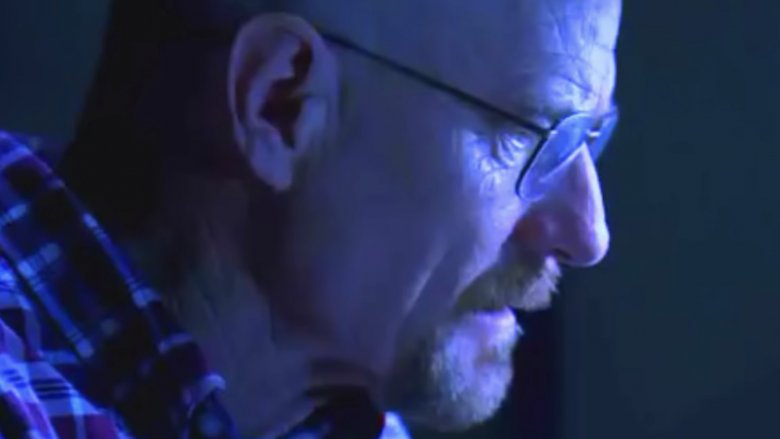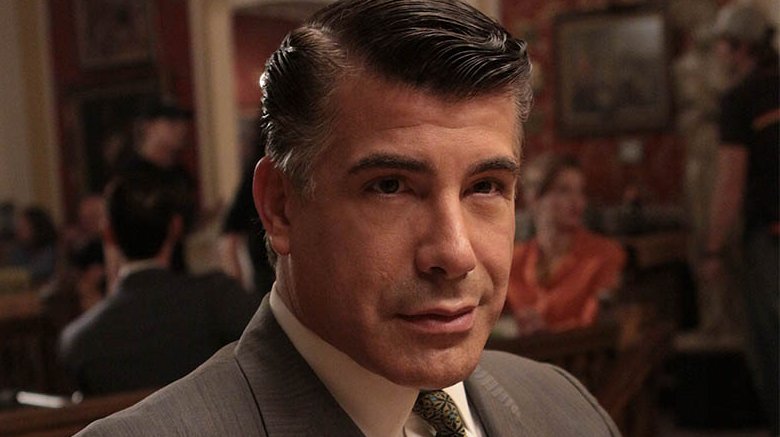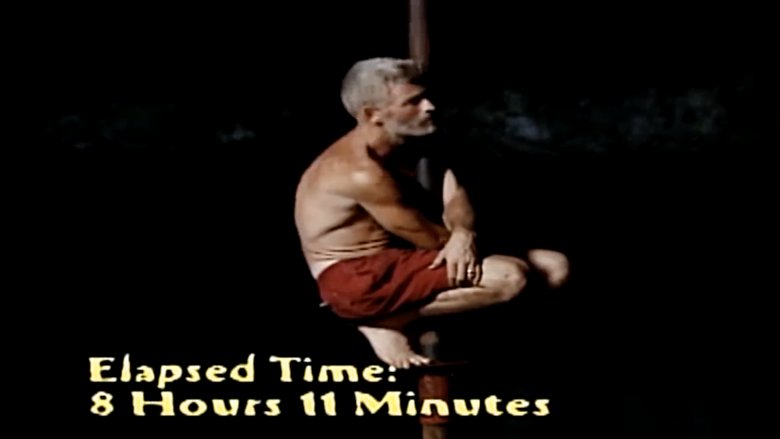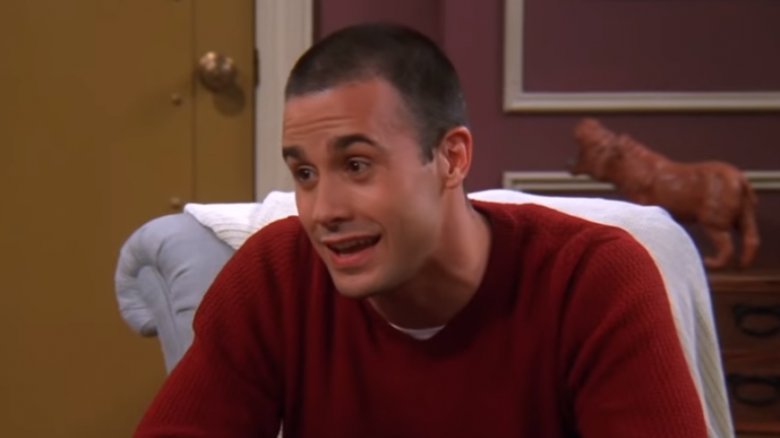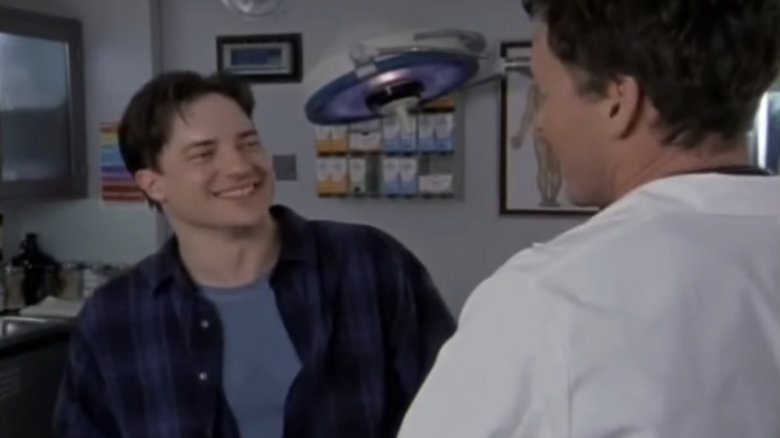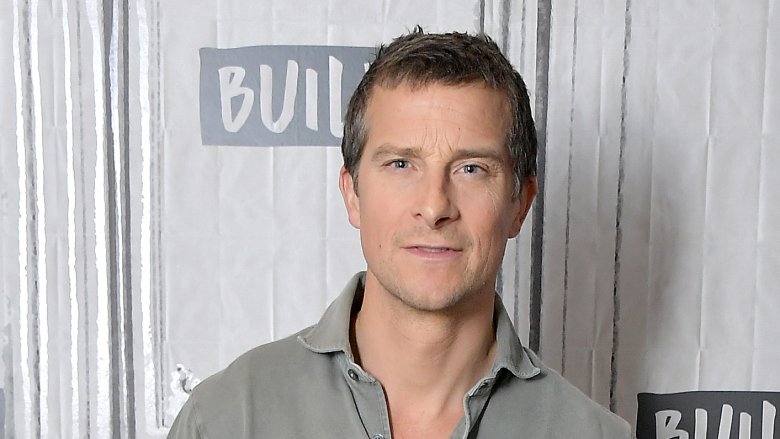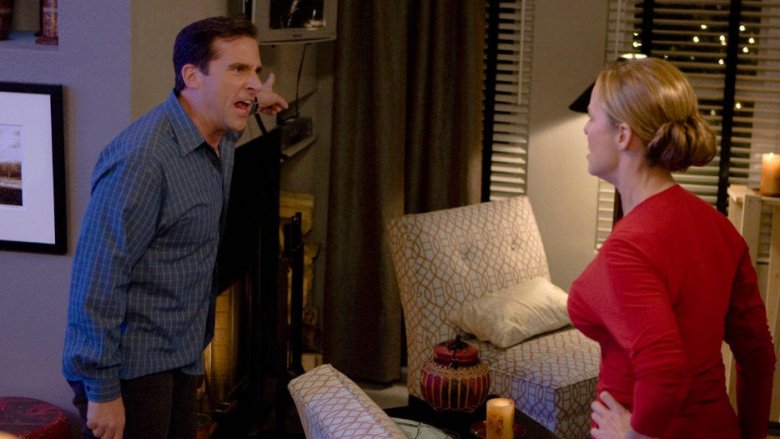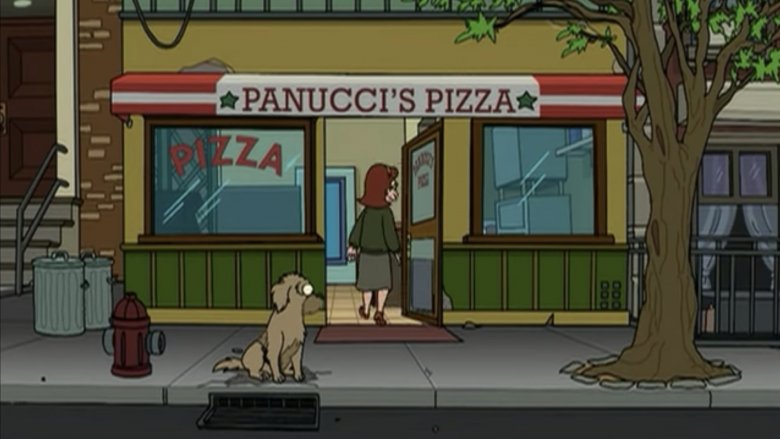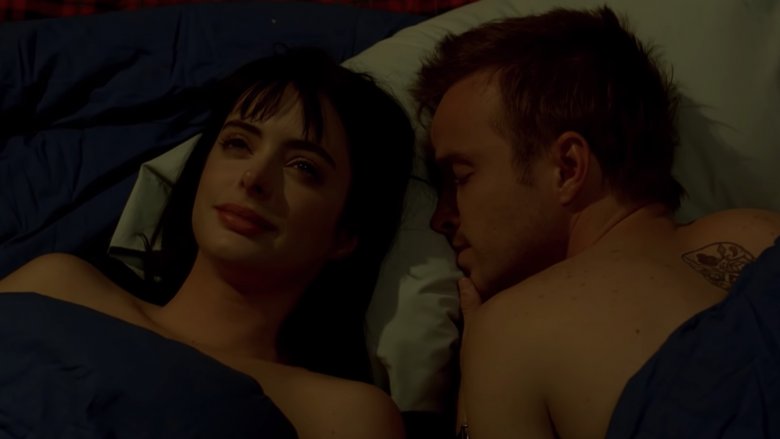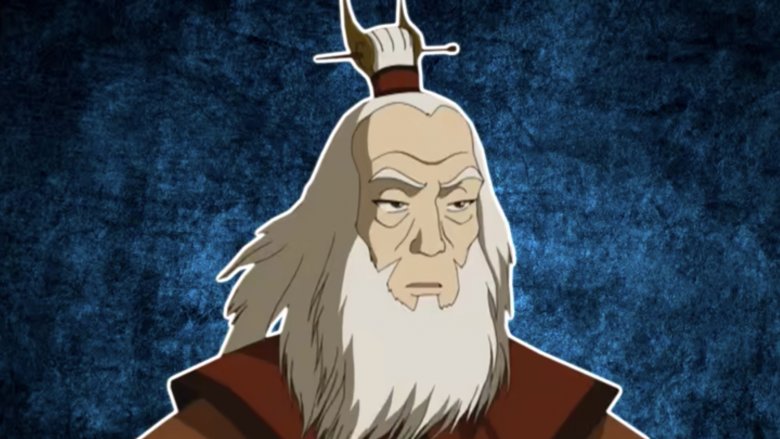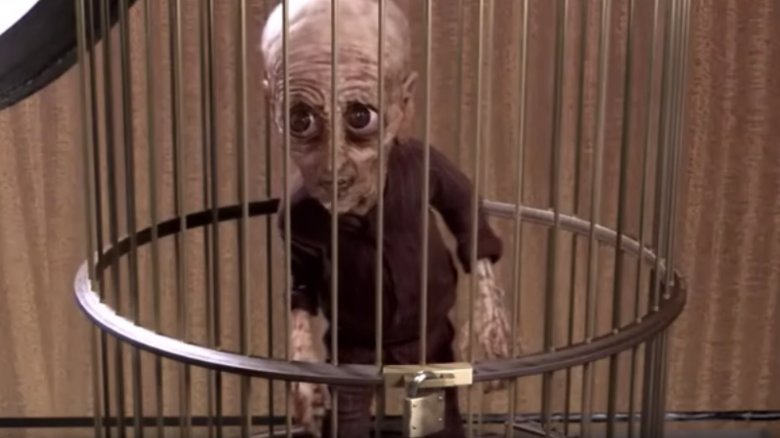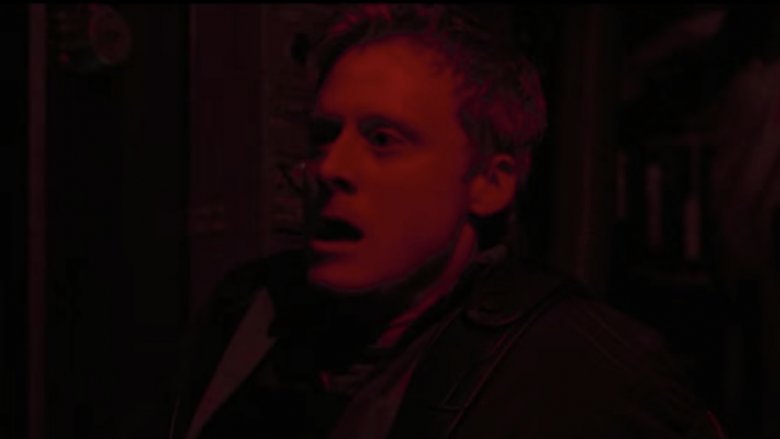Darkest TV Moments From The '00s
It's easy to remember TV shows of the '00s as a relentless rainbow of upbeat, primary-colored tales about people being there for one another, especially when the rain starts to pour. However, that televisual happy-scape of yesteryear (okay, less than 20 years ago) was actually speckled through with its fair share of dark 'n' dreary moments.
The seedy televisual underbelly of the not-so-nice double-oughts had something mean, gritty, or just plain not cool for everyone — from grueling reality show psychological warfare to depressingly anti-climactic space deaths to a cold-blooded chemistry teacher with a serious ax to grind.
So minimize that LimeWire session and give the endless Crazy Frog memes a rest. Let's crack through the sweet, sugary, and seemingly wholesome outer shell of 2000s-era TV to take a closer look at that delicious layer of darkness curdling just beneath. Here are some of the darkest TV moments from the '00s.
Mad Men: An unacceptably fabulous secret is revealed, buried
Fans of Mad Men appreciate its brooding subtlety, and one of the many things this show gets so terribly right is its potent exploration of repression. Exhibit A is Salvatore Romano, an obviously gay man desperate to conceal his sexuality. In "The Arrangements," Sal is at home with his wife, Kitty. In an effort to explain his work, Sal acts out a scene of a commercial he plans to shoot. In the process, he imitates the female actor, right down to seductive feminine glances and pretending to wriggle out of a dress.
It's incredibly convincing. Without meaning to, Sal accidentally steps right out of his comfy closet into the cold, fluorescent-lit truth, and Kitty suddenly understands that her husband isn't the red-blooded, straight-laced manly man he pretends to be.
It's painfully intimate to watch this private moment when a dark secret finds its way to the light, but the real darkness emerges when absolutely nothing happens. Kitty sweeps it under the carpet like a good '50s housewife would — and their relationship, threadbare and incomplete as it is, continues as if nothing had happened.
Carpet sweeper: 1. Emotionally healthy relationships: 0.
Survivor: An endurance challenge gets nasty
If the reality show Survivor has taught us anything, it's that backstabbery in all its treacherous forms is going to happen when you're trapped on a small island with a bunch of unreasonably buff extroverts. However, Survivor: Palau was an exceptional season. A seemingly unbreakable alliance formed between three competitors (Ian, Tom, and Katie). The producers, likely realizing they needed to bust the unbreakable piñata of their friendship wide open, devised a particularly gruesome endurance challenge.
Perched over the ocean on a pole with only a tiny foothold for balance, the three comrades were exposed to relentless thirst and scorching heat, but the deeper torment was more subtle. The competitors were uncomfortably close to one another: close enough to talk, close enough for (cue dramatic music) demons to come out to play.
Viewers got to watch in slow motion as their friendship dissolved like an ice cream cone down a crying toddler's arm. Katie dropped into the ocean after six hours. Tom eventually talked Ian into accepting blame for Katie's plight a brutal 12 hours into the ordeal, and Ian bowed out of the race — a decision he later said had little to do with physical fatigue. The real darkness of this scene was that in its final moments, this ordeal wasn't about surviving at all. It was about something much pointier: the dance of guilt, manipulation, and exactly how far you were willing to go for a cool million in prize money.
Friends: The One Where Ross Reveals His Goofy Inner Homophobe
Friends has a rep for being almost relentlessly upbeat and wholesome. But watching it a decade or so later reveals some problematic storylines. In this episode, Ross and Rachel are looking for a nanny. After several interviews, they find the perfect candidate, but (horrified gasp) he's a man. Ross freaks out, refuses to accept that a straight dude could ever willingly work in such a suspiciously nurturing role (also, what would be wrong with a gay nanny, if he were gay?), and goes on to sabotage the whole process.
Basically, good guy sensitive Ross becomes a card-carrying, certified bigot, and it all happens with an upbeat soundtrack and healthy bouts of canned laughter. The darkest thing about this episode is that it wasn't at all intended to be dark. At the time, it was just another Friends episode peddling the trademark sitcom formula of hilarious hijinks and comfortable familiarity that made the show one of the most-watched sitcoms of the time.
We were all expected to simply laugh along, and at the time it's probably fair to say that most viewers did. It's a revealing episode when you watch it today, and it leaves a lot of viewers squirming uncomfortably, wondering if Ross and his prejudices could be any more obvious.
Scrubs: Dr. Cox cracked and so did fans
Set in a hospital, Scrubs inevitably dealt with some weighty themes. A backdrop of death and illness combine with complex characters to create a rich and subtle idea soup for amazing story-telling. "My Screw Up" takes all that grist for the mill and delivers a storyline that still elicits a "don't even" from fans.
The episode tells the story of a death of a patient on J.D. and Dr. Cox's watch. Dr. Cox blames J.D., but Cox's kind brother (played by Brendan Fraser) implores him to find forgiveness and accept the fact that life goes on. At the end of the episode, we learn that it was actually Cox's brother who died of cancer, and that Cox is struggling to accept the reality of his brother's demise along with all the guilt that came from not being able to save him.
The venom-tipped barb in the hell-scorpion's tail of this episode is that we're witnessing the emotional collapse of a character whose whole schtick, charm, and raison d'etre draw from his unbreakability. Seeing this gritty character reduced to living out a delusion is a sharp and painful punch to the soul giblets. But the ouchiness is only compounded by Brendan Fraser's ... well ... Brendan Fraserliness. He just kills the role of Dr. Cox's gentle and quirky brother, and seeing him leave the series in a box is just a few shades darker than you might expect from a comedy show.
Late Night with David Letterman: Becoming the voice of history
For the most part, late-night talk shows offer a beige assortment of sensible chuckles, self-referential quips and special guests with "unscripted" stories about their down-to-earth japes (often involving a pet dachshund named Biggles or something). But David Letterman broke with beige convention on September 18, 2001, when he made the bold decision to return to air after the terrorist attacks of September 11.
Most programming ground to a complete halt in the wake of the attack. Broadcasting anything other than the straight news was possibly career suicide. But Letterman sat at his familiar desk and delivered an eight-minute speech to a largely silent audience. He didn't say anything particularly unexpected or insightful. Visibly distressed, he praised the police and firefighters and spoke about the importance of courage in tough times.
A self-confessed grumpy old fart, the fact remains that David Letterman was the right human to clear his throat, straighten his excessively long tie, and get the national conversation started. In a dark moment in U.S. history when the overwhelming consensus was "way too soon," Letterman made the gutsy call to talk about it and give the pit-in-your-stomach feelings of that moment shapes and names.
Man vs. Wild: Bear Grylls jumps the shark
Even hardcore fans of this "one man against the entire natural world" reality TV show will admit its central premise is more than a tad doofy. It goes something like this: Overly enthusiastic survival doofus (improbably named Bear Grylls) is airdropped into the heart of a remote and desolate hellscape. He fashions a rudimentary animal trap from his trousers. He briefly contemplates drinking his own urine before miraculously surviving and offering a useful life lesson about backpacks.
In one particular episode, Grylls' camp is invaded by a grizzly bear, placing him in a life-or-death pickle. His viewers are offered a sobering lesson about the dangers of being alone in the wilderness armed only with a pair of trousers. It was later revealed the "bear" was in fact a dude in a fancy dress costume. This led to a cascade of revelations, including the fact that Grylls stayed in hotels after a hard day's shooting (probably in a fancy pink smoking jacket and novelty flamingo slippers).
On one level, it's just amusing to imagine some poor schmuck schlepping around the Canadian Rockies dressed as a bear, not to mention the schadenfreude of Bear Grylls' career being kicked squarely in the zipper of his designer combat pants. But it also represented a high-water mark in just how gullible and easily deceived TV producers expected their viewers to be — a trend that would rage unabated (in vastly more ominous manifestations) well into the next decade.
The Office: Guess who's never coming to dinner again?
There's something enduringly lovable about The Office. The show is, if nothing else, a brilliantly absurd character study of an awful man. He's redeemable sure, but he's utterly awful. In "Dinner Party," we see Michael and Jan in their home for the first time. Over a period of many painful hours crammed into 22 minutes, we sit alongside their guests as the happy facade of their relationship slowly crumbles, ending in a horrific screaming match and a stern visit from the police, who ask Michael if he has somewhere safe to stay for the night.
The dinner party from hell is a trope we've all seen many times. It's been done. It's trite even. Sure, your standard "dinner party gone wrong" storyline is unpleasant; but dark? Not really. However, in The Office's version, we hit on a solid vein of pure, grade-A stygian nastiness.
The episode perfectly captures the crawling trapped sadness of a dysfunctional relationship slowly circling the drainpipe of mutually assured misery. Kind of amazingly, it somehow manages to remain funny. But in an outstanding comedy series with so many ridiculously colorful characters, this tense moment is jarring, even painful to watch for anyone who has lived in an abusive relationship. As our noses are thrust up against the window pane of his messed up home life, suddenly the viewer encounters a hell that even Michael Scott does not deserve.
Futurama: Twisting your feelings into a doggie chew toy
The beautifully puzzling thing about Futurama is that it's so much more than it rightfully should be. So many quirky and original tales were made from the tired premise of a slightly clueless dude who travels forward in time.
"Jurassic Bark" is a man-and-his-dog story. Thanks to [insert scientific reasons here] Fry learns that his beloved pet dog, Seymour, lived on for 12 years after they were separated. Fry is given the option to clone his best friend, but after much soul searching decides not to, reasoning that it would be unfair to bring his furry friend into an alien and inhospitable future.
Left here, the story has a light, if mildly predictable, message that goes something like: "Science can't manufacture love, so treasure the time you have because it's unique. Also, dogs are awesome." But this story has a disturbing twist. The viewer is treated to a flashback of Seymour living the remaining years of his life waiting for Fry's return. In the final moments, Seymour lies down and closes his eyes for the last time, never knowing what became of his best and only friend.
Boiled down to the basics, this is a story about a dog who loves its owner. But it's brutal. It's unfair. We're left to ponder the futility of Fry's nobility. Ultimately, the tragic sting is that Fry should have been selfish. He should have taken the easy route, dang it.
Breaking Bad: White by name, black by soul
No list of dark shows of the '00s would be complete without a Breaking Bad mention. A show about the descent of a lovable chemistry teacher into the life of a meth kingpin is inevitably going to have a few Debbie J. Downer moments, but this scene arguably blacks out any other chapter of Walter White's journey.
In the episode "Phoenix," for various meth dealer-related reasons, Walt is forced to break in to the home of his friend and business partner, Jesse Pinkman. There he finds Jesse passed out in bed with his girlfriend, Jane, who is clearly in the final stages of dying from a drug overdose. We see Walt panic and hesitate a moment. Then he gathers himself, takes a step back, and stands by quietly as she (quite graphically) dies.
At the point where he does nothing when he clearly could have saved a life, the feel of the show changes irrevocably. We see that Walt isn't going to be written around that conventional trope of "a good guy forced to do bad things by uncontrollable circumstances."
Walter White is capable of stuff, and some of it might even qualify as fully blown evil stuff. Years later, Brian Cranston said of that scene that his real daughter's face took the place of Jane's while he was acting.
The Last Air Bender: The unsatisfactory demise of Avatar Roku
A wise and merciful figure, Avatar Roku provided a moral compass for this beloved animated TV series about elemental magic. In "The Avatar and the Fire Lord," Roku and his old friend Sozin join forces to save his home village from an erupting volcano (as one would). They succeed, but at the last moment Roku succumbs to poisonous volcanic gases. He gasps for help, but Sozin, realizing an opportunity to grab power, simply flies away, leaving his oldest, dearest friend to die.
As Avatar Roku collapses, his animal guide (a cool dragon who also very much doesn't deserve to die) curls up beside him, preparing for death beside the owner he loves. The key point here is that this is a kid's TV show. While Avatar was built around a pretty heavy universe, it was fundamentally intended for a young audience. Killing off a beloved character in this unheroic fashion is a pretty bitter pill in that context.
Think of Gandalf throwing out his hip on Mount Zirakzigil and muttering "help I can't get up" in Elvish while slowly freezing to death. Now make a young, hope-filled teenager watch that.
Doctor Who: Tales of an unfortunate space potato
Ahh Doctor Who. It's patchily written. It's criminally self-referential. But there's just something appealing about a debonair time traveler with a cool hairdo solving obtuse space crimes. In "Last of the Time Lords," Doctor Who's arch nemesis uses some frustratingly arbitrary space technology to defeat the Doctor, handily reversing his ability to regenerate. More space reasons ensue and the once powerful and brilliant Gallifreyan is reduced to a weird goblin-like creature vaguely resembling a microwaved potato on a stick.
For years, said space potato endures the indignity of life in a bird cage, while the Master struts about like a git, plotting various unpleasant things for the known universe. It is true, the Doctor eventually escapes, regains his elegant coiffure, and in a fit of (quite understandable) annoyance, slaps his nemesis down with a messianic display of flashy space-time powers.
But by then it's simply a case of too little, too late — the damage had been done. It was all just too weirdly, grossly macabre. The whole birdcage scenario was a nightmarish circus carnival of a fate unbefitting a Time Lord. As one, a million Whovian fans cried out "what the hell just happened?" and were suddenly silent. With its over-the-top horror element and some decidedly potato writing, it's still considered one of the lowest points in Doctor Who history.
Firefly/Serenity: The 'George R.R. Martin-ing" of Wash
Casually drop the words "Serenity" or "Firefly" among a gaggle of thirty-something sci-fi geeks and a thick, impenetrable silence is likely to fill the room. To understand the true black hole at the heart of Firefly's darkest hour, you need to get up close and personal with the show's true villains, the reavers. The reavers are among the scariest, butt-clenchingest space baddies conceived by mortal mind. At a basic level, they're post-apocalyptic space cannibal zombies, but that's like describing a York Peppermint Pattie as a Frisbee of edible toothpaste. They're terrifying.
Then, of course, the show got canceled. (Pretty dark in and of itself, to learn that we wouldn't be getting very good sci-fi TV during the decade.) In the final throes of the movie, the heroes make their last stand. Hoban Washburne, the ship's pilot (and one of sci-fi's most quirky, beloved, and just all-around cool characters) takes a jumbo deluxe reaver spear to the chest.
It's all so depressingly anticlimactic. Not only are we losing a character we love (thanks to his exploits evading aforementioned space freaks), it happens too quickly for the moment to become a dramatic high point. He's alive. Then he's deader than a can of overcooked Spam.
Unleashing a torrent of dramatic energy by killing someone built up to be special is a classic George R.R. Martin move, but Whedon does it with all the shrugging flippancy of Tarantino. The cocktail of emotions it produced is a bitter brew, darker and more foul than the worst motel coffee imaginable.
